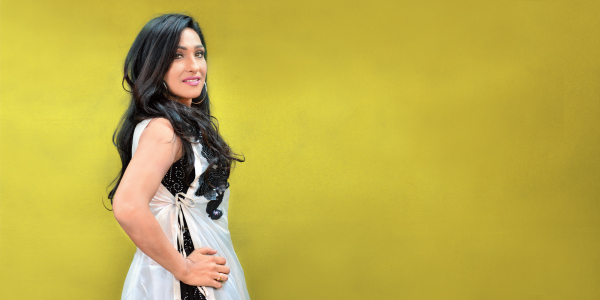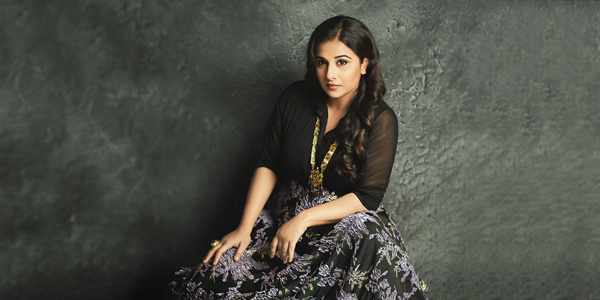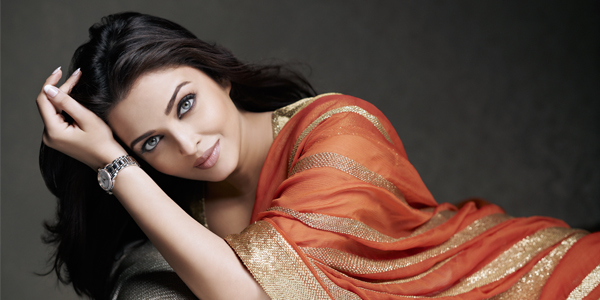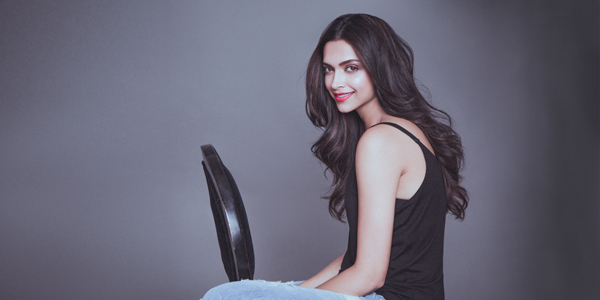The accidental actor
A rank outsider, Tapsee Pannu’s journey to stardom is more than just providence
Aaj main upar, Aasman neeche,
Aaj main aagey, zamane hain peeche
The sound track from the 1996 Hindi movie Khamoshi is how Taapsee Pannu best describes her state of being. But Pannu is not your Bollywood stereotype who has her head in the clouds, but a person who has her feet firmly planted on the ground. The girl from Delhi, who got her break in Bollywood in 2013 after being referred to as a “younger version” of the zesty Preity Zinta, has today come into her own in an industry where nepotism and cliques are all-pervasive. Dressed in a polka-dotted jumpsuit paired with a dark-blue denim jacket, the svelte 31-year-old is just days from her new release, a Hindi thriller titled Badla, when Outlook Business catches up with her at her nest in suburban Mumbai. Badla incidentally happens to be Pannu’s second outing with Amitabh Bachchan, who starred with her in Pink, the movie that got the industry to sit up and take notice of the computer science engineer’s acting chops.
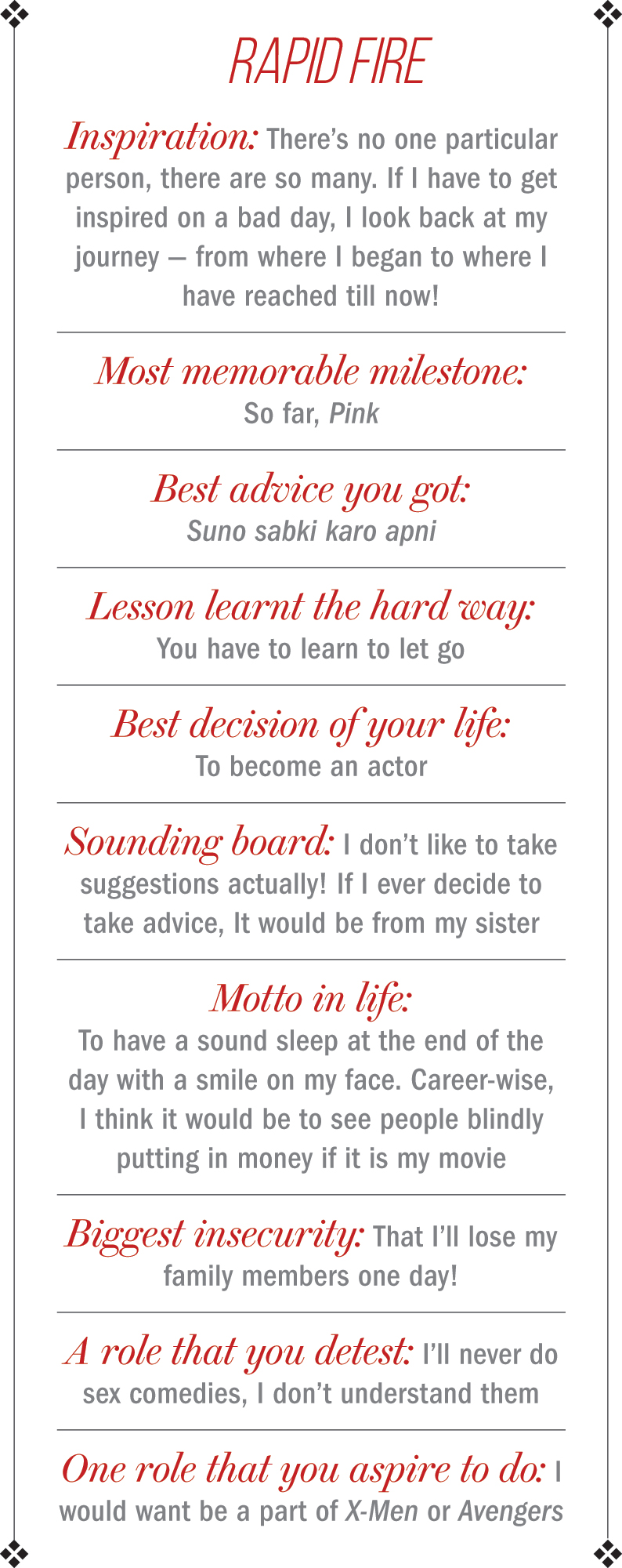 In seven years with 12 Bollywood flicks, Pannu has created a niche for herself by starring in movies where the script is the star and the female protagonist plays the central role. Barring a handful of rom-coms, Pannu got to showcase her repertoire with movies such as Pink, Baby, Naam Shabana, and Manmarziyaan.
In seven years with 12 Bollywood flicks, Pannu has created a niche for herself by starring in movies where the script is the star and the female protagonist plays the central role. Barring a handful of rom-coms, Pannu got to showcase her repertoire with movies such as Pink, Baby, Naam Shabana, and Manmarziyaan.
In less than a decade, following her debut in the 2010 Telugu film Jhummandi Naadam, directed by K Raghavendra Rao, followed by a Tamil film Aadukalam, which won six awards at the 58th National Film Awards, Pannu has managed to firmly entrench herself as an actor both in the South and Bollywood. That’s no mean achievement, considering that Pannu had never planned for a career in tinsel town to begin with!
The regular girl
A Jat Sikhni, Pannu grew up in a typical household where her mother managed the show, while her father worked with a construction firm. Studious by nature, Pannu had a penchant for mathematics and was among the top ten students in her class, even as she showed an interest in extra-curricular activities. She participated in all public-speaking competitions at school, was the head scout and performed as a Kathak dancer, after training for eight years under one of Birju Maharaj’s disciples. “I had never acted in plays, either in school or college,” says Pannu, who actively played sports during her days at the Mata Jai Kaur Public School in Delhi.
That said, her focus never wavered from academics and she scored 90% in her Class XII CBSE exams, and took computer science in college. Two years into her graduate studies, she realised that she wasn’t cut out for that field and decided to pursue an MBA. Pannu took the Common Admission Test (CAT) exam, but failed to make it to the top percentile needed to secure an admission into a college of her choice. “I decided to sit at home for a year and prepare for CAT again,” says Pannu, who also chose not to take up a campus placement offer from IT bellwether Infosys.
Incidentally, during her days in college, Pannu decided to do part-time work to meet her personal expenses. Having a supportive mother only made that choice easier. “My mom was supportive of my decision to create a professional portfolio shoot. She just believed in whatever I did,” says Pannu, who ended up using her mother’s savings of around #40,000 for the shoot. As things turned out, the very day she ended up doing the shoot, she got offers to feature in an advertisement for a foreign telecom company, and another one for a local knitwear brand. The two shoots fetched her around #11,000, but, more importantly, it validated her decision to pursue modelling, but not as a career option.
“Though my dad was very particular about how we look, our dressing sense, and even got me to wear braces in my eighth and 12th standards, he was anxious that his 19-year-old would drop out of studies and become a model,” recalls Pannu. Following the modelling assignments, Pannu soon started getting film offers from the South. That’s when she struck a deal with her dad. “Give me a year of my life and if things won’t work, I will complete my MBA,” Pannu told him. But that wasn’t going to be the case.
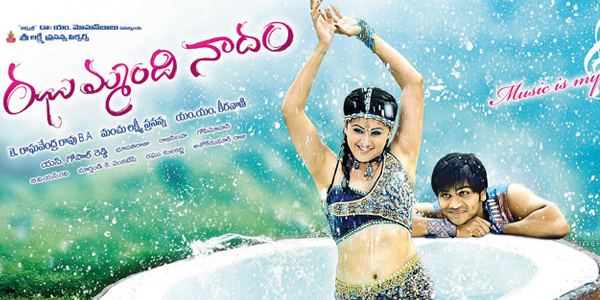
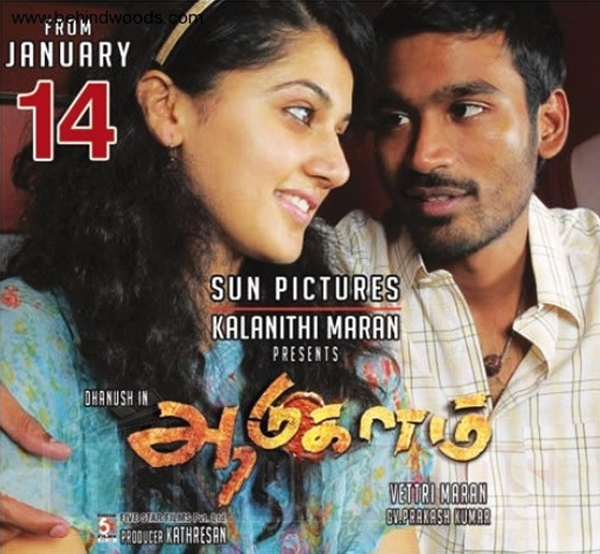
After looking up the people who were making the offers from South, Pannu finally took the plunge and landed up in the south with her baggage, and CAT books in tow! However, Tamil and Telugu aren’t easy languages to learn, leaving Pannu with little time to read up for the CAT exam. “I was completely at sea with the languages. I couldn’t figure out what expressions had to go with the dialogues” says Pannu. But not the one to get bogged down, she prepared for her scenes before reporting to the set and, with the help of assistant directors, grasped the nuances of the languages.
Her first shot before the camera was for her Tamil film with Dhanush, Aadukalam, directed by Vetrimaaran. It was a scene that required her to look lost and confused. “It was only later I realised that I had to say the dialogue in such a fashion,” says Pannu with a chuckle. With two films under her belt, she travelled between Coimbatore and Hyderabad for her shoots. Though she began work with her Tamil movie, her Telugu movie Jhummandi Naadam was released first. Both the movies turned out to be hits with the Tamil one fetching national awards. Pannu was just 22 then. But the response she got, convinced her that, with a little more effort, she could indeed do well in movies.
But there was a twist in the script. After tasting initial success, her movies in Telugu bombed one after the other, even as her movies in Tamil did well. Pannu got her first taste of ugly press, who wrote her off. She was even labelled a ‘bad omen’. “It was indeed a difficult time but it didn’t hurt me deeply. I was okay not doing movies and going back to studies, it wasn’t a do-or-die situation,” recalls Pannu.
It was at this point that she chose not to listen to what others had to say. She began choosing scripts that she felt would work, even if that meant doing only one movie a year in Telugu, and listening to taunts that she “wasn’t getting offers.” But the tide changed: after doing 10 movies down South, Pannu got her first break in Bollywood when Puri Jagannadh recommended her name to Viacom which was producing Chashme Baddoor, directed by David Dhawan. The ‘look test’ with Dhawan gave Pannu the jitters when the director left the shoot midway. “He said ho gaya and left, and I was at my wits end trying to understand whether it meant a yes or a no,” she recalls. But as the story goes, Chashme Baddoor turned out to be her stepping stone to Bollywood.
The struggle for acceptance persisted. She was invited to events and award functions, but made to sit in the back row — the way the industry treats wannabes. “I knew that proving myself would be a struggle but what I couldn’t understand was that the actors who were seated ahead of me hadn’t even done half the movies that I had. Just because I did movies in a language that was alien to them, my work was being undervalued,” says Pannu matter-of-factly.
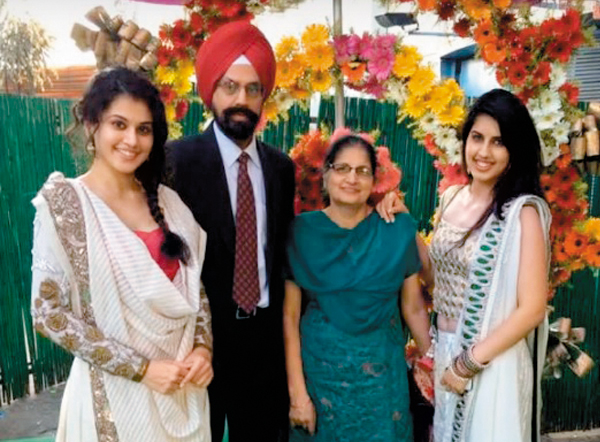
She began to stay away from such public events. “The last thing I wanted to be known as was a social climber. After all the hard work and struggle, I didn’t want anyone saying that I had come this far because of someone else,” says Pannu.
Pannu chose to bide her time and chose roles that mattered. “I had seen how actors from the South had entered Bollywood, did some big movies and then faded away. Anyway, I didn’t want to do roles that I had done in the South,” explains Pannu.
Baby was the first film in her career that Pannu really chased. After learning about the character and the movie, she auditioned for the role, though director Neeraj Pandey never thought she could do it, believing her to be “too coy”. There were naysayers too. “Everyone said, ‘you are not even cast opposite Akshay Kumar’, ‘you don’t even have a song’. But I knew that I could make my presence felt with just 10 minutes of screen presence,” says Pannu, whose 20-minute role in the 2015 movie as Kumar’s accomplice, Shabana, did get noticed. She even endured pain, when an old ligament tear resurfaced during the shoot. But she chose to go ahead with her action sequences, and ended up using the services of a physio in private. “I was afraid of losing the role. I told this to the movie makers after the scene was done, and they laughed saying that they would have been more careful but wouldn’t have chopped out my role,” says Pannu with a smile.
But that grit did pay a dividend in the end. Pandey, convinced about Pannu’s ability, cast her as the lead in Naam Shabana in 2017. “For a two-movie-old actor, getting a titular role was just surreal. But it also gave me a confidence that, if I really worked hard on roles with a difference, I would find my way through,” says Pannu. Naam Shabana turned out to be a crowning glory, coming on the back of her much-acclaimed role in the movie Pink with Bachchan.
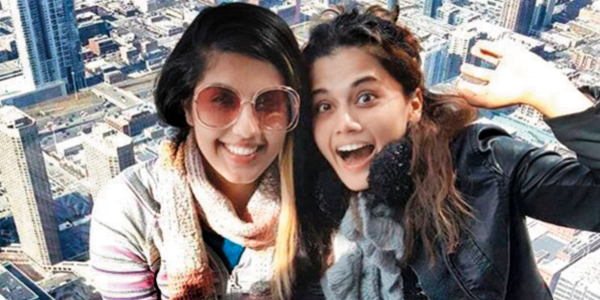
Pannu makes a conscious effort not to be typecast. “Once I have played a molestation victim, I don’t want to do that again. I have rejected countless films till now. I don’t want to spoil the sanctity of a role that I have already done. Similarly, I don’t want to play a spy, unless the movie is taking the role several notches higher… I don’t want to repeat myself,” she says.
Even though rejecting roles means lesser work, Pannu is happy doing that. But what she is not okay with is unprofessionalism. After having been told to set aside her dates for a role in the movie Pati, Patni aur Woh, Pannu came to know from the media that another actor has been finalised for the role. “I have been replaced in movies before, but I have been informed about that clearly. It was not done in this case. I am okay being thrown out, but be professional about the whole thing. Though I have sorted out the issue with the producers, I believe actors should be treated with respect,” says Pannu.
For now, Pannu’s plate is definitely full with Game Over, a bilingual movie in South, Mission Mangal and Saand Ki Aankh, a biopic. “I have made peace with the fact that I will not be considered a mainstream conventional heroine, and that this race to the top is going to be much longer. I would prefer people liking me for my roles, and not for looking chic with blow-dried hair,” quips Pannu.
Just as grounded as she sounds about her place in the industry, so is her view on the pay disparity between male and female actors. “At the end of day, movies are a business. The day I can bring in a first-week collection like a top-rated star does, I will ask my price. You have to earn it,” sums up Pannu.

